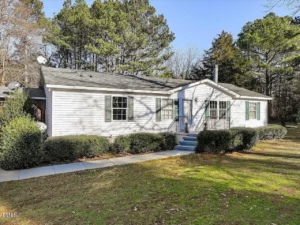Some inspectors know their area very well. For example, in Chatham County, we have inspectors who are familiar with every single builder in Pittsboro and Siler City. They’ve seen these builders homes dozens of times and know precisely what to look for. In the rest of the video, Pittsboro real estate agent Eric Andrews discusses how a new, second round of negotiations begin after the inspection has taken place.
Speaker 1: What can you tell us about North Carolina home inspections?
Speaker 2: So in North Carolina, when you buy a home, it should be part of the process. You’re allowed your due diligence, and part of your due diligence should be a home inspection.
And a home inspector is going in and they’re going to evaluate basically mechanicals, the big thing being HVAC, hot water heaters, basic plumbing, basic electrical, structural details, roof, windows, and whether or not there’s any rot.
Or also North Carolina, we have a lot of crawl spaces. We want to make sure that there’s no water, standing water in the crawl spaces. So home inspectors, I definitely highly recommend them, but they can’t find everything.
Speaker 1: All right, can anybody do a home inspection?
Speaker 2: Anybody can do a home inspection. You’re allowed to do a home inspection for yourself. You can hire a general contractor to do a home inspection, but it is certainly best to have a certified license North Carolina home inspector. There’s a home inspection board in North Carolina, just like there’s a real estate professional board, real estate commission.
The home inspectors have one. There’s no requirement to use a licensed home inspector, but you can go and sell a house yourself and not have a real estate agent. Very similar, you’re definitely better off having someone that’s licensed. And not only somebody that’s licensed, but somebody that has a good reputation and has been doing it for a while.
Speaker 1: Okay. So they’re not required?
Speaker 2: Not required, no. I mean, you can do your own home inspection. If uncle Bob is a general contractor and doesn’t have a home inspection license, you can use uncle Bob. But it’s just, it’s you really should go with a professional. They certainly will pay for themselves.
Speaker 1: How do you request one? Do you do it yourself or ask your real estate?
Speaker 2: Yeah. I mean, that’s something that your real estate agents should know. I mean, it’s not best to have a Raleigh home inspector do inspections in Pittsburgh because the building codes are different. And there are certain things that we deal with. I mean, we don’t have Well or septic issues in Wake County, like we do in Chatham County.
There’s different levels of runoff and condensation. And not everything used vapor barriers in Chatham County. So all those things are important. And it doesn’t mean that Chatham County has lower standards, it’s just important for people to know. It’s really, if you use a Pittsburgh home inspector and he knows XYZ builder built the house, he knows that builder often messes up on this.
And that’s something that he’s got a key on. We had one builder that he used to always do the chimney was a little bit offset and water used to always come between the roof for this one particular builder. And so when your home inspector knows that the house was built by that builder, that’s something he’s got to key in and focus in on. So just like real estate, it’s so much better to use someone that’s familiar with that area.
Speaker 1: Should people go to the home inspection or just let the guy or female or whoever [crosstalk]
Speaker 2: Well, so that’s an interesting question. North Carolina home inspection board and the real estate commission says, “Yeah, you should go.” But as a real estate agent, I see no value in it. And you might distract the home inspector. You might get caught up on an issue that’s really not a big issue. You get a fully comprehensive report.
It’s amazing how detailed the report is. I mean, it’s 50 to a hundred pages long. And the common thing that I have to tell my buyers is that once you get this report, you’re not going to want to buy the house. I mean, they make it look like it’s Poltergeist and it’s about to sink into the ground. They make it look like it’s the worst thing ever.
There are things that come up that are bad and there are walkaway situations, but you need a real estate agent that has been involved in the process a long time and said, “You know what? These are key issues. This is something that’s going to come up again. This is something that’s going to be expensive down the road.”
And so I don’t know if there’s any value in you being at the home inspection report. If you have a key issue, if there’s something that’s really, really important to you and you want to come to the inspection and ask the inspector about that specific issue like, “I saw a soft spot near the bathtub, will you please take a closer look at it?” You can go with him, watch him do it.
And he can talk to you right then and there. And that might alleviate concerns. But really, really what we want is the home inspector to do his job, give us the full evaluation. We want the potential buyers to read it. We want the real estate agent to read it. And then we want the buyer’s agent real estate agent and the buyers to come together. And then talk about that report and see what is important to them that they’re going to request and what is not.
Speaker 1: Should you get a house reinspected after it’s been fixed?
Speaker 2: It depends too. So the inspector’s probably not going to charge as much to come back out there. They’re only going to look at the specific items that were addressed. I can tell you that I love home inspectors and I want them to get paid as much as they can possibly get paid.
But if there was a leak under the sink and we have A-1 Plumbing come out there and we know A-1 Plumbing’s really good. And A-1 Plumbing says, “I replaced the entire pipe. Everything’s good. Here’s the bill.” That should satisfy you as everything’s been done. So I think it would be a waste of funds to have the inspector go back out there.
Now if he says, “The floor’s about to fall away and you need another peer here,” you might want the inspector to come back out for that. Or you might want a structural engineer to come back out there and say, “That’s good.” So there are certain things where we do want to get reinspected and there are some things that aren’t important to get reinspected.
Speaker 1: Do you need additional inspectors such as a termite inspection?
Speaker 2: Yeah. Yeah. Yeah. These guys can’t, usually they can’t do everything. So we want what’s called a WDI report, wood destroying insect. That’s what most people call a termite inspection. But there are things other than termites that eat your house. We have carpenter bees, we have carpenter ants and we have…
Speaker 1: Pill, or.
Speaker 2: Beetles. What are they? Post.
Speaker 1: Post.
Speaker 2: Powderpost beetles.
Speaker 1: Powderpost.
Speaker 2: Gosh. I should know these things. And the Powderpost beetles are usually really, really older homes or whatever. But you can actually see the dust on the ground and they are doing damage and everything. So, yeah. And also with the WDI report, one of the big things is we don’t want wood touching the ground. We don’t want Cellulose material touching the ground.
That’s what termites like to eat. And so, and then moisture is a big thing too. So a lot of times with the termite inspection, they’ll give you a moisture report. So you don’t want a really, really high moisture reading. So yeah, so we got the WDI report. And then, because we are in Chatham County and this is a rural area, we might want a Well inspection.
And a Well inspection is an inspection of the Well, it’s not of the water. You might want a water inspection. That is what’s coming out of the Well. And then you also might want a septic inspection. If something else were created, if they built, if they did an add on, if they did a porch, if they did a swimming pool or something, then you might want a specific extra inspection in that regard.
But yep, additional inspections. And then a lot of the home inspectors aren’t structural engineers. So if there’s this big porch that was added on and it wasn’t bolted on right or the columns looked real skinny, the home inspector might defer and say, “I’m not sure about that porch. Go ahead and get a structural engineer.” So that’s an additional inspection as well.





